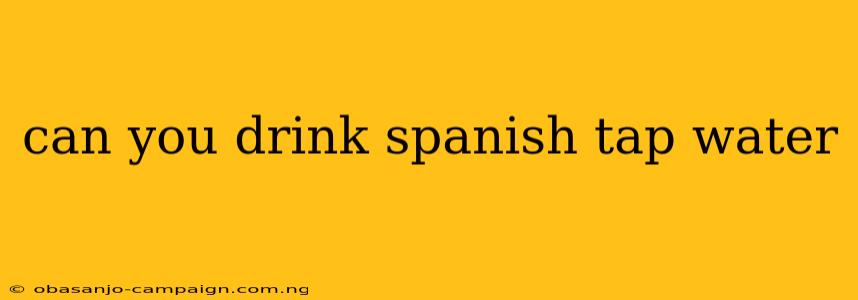Can You Drink Spanish Tap Water? A Comprehensive Guide to Water Safety in Spain
Spain is renowned for its beautiful beaches, vibrant culture, and delicious cuisine. But for many travelers, one of the biggest concerns when visiting a new country is the safety of the tap water. Can you safely drink Spanish tap water? The answer isn't a simple yes or no. The quality of tap water in Spain varies greatly depending on the region and even within different areas of the same city. While many areas have perfectly safe drinking water, others might require caution. This guide will delve into the specifics of tap water safety in Spain, providing you with the knowledge you need to make informed decisions about your water consumption.
Understanding Spanish Tap Water Quality
Spain's tap water is generally considered safe to drink. The country has a robust water treatment infrastructure, with municipalities responsible for ensuring water meets national standards. These standards are stringent and adhere to European Union regulations, including parameters for bacteria, chlorine, and other contaminants. However, the reality is more nuanced.
Regional Variations in Water Quality
The quality of tap water in Spain can fluctuate depending on the region. Some areas, particularly in major cities like Madrid and Barcelona, boast excellent water quality. However, other regions, especially those with older infrastructure or relying on groundwater sources, might experience occasional issues with water quality.
Here are some factors that contribute to regional variations:
- Infrastructure: Older water pipes and treatment facilities can be susceptible to leaks and contamination.
- Groundwater Sources: Water drawn from underground aquifers can sometimes have high levels of minerals or other contaminants.
- Agricultural Practices: Runoff from agricultural areas can introduce pesticides and fertilizers into water sources.
How to Assess the Quality of Tap Water
If you are unsure about the safety of tap water in your location, here are a few tips to help you assess the situation:
- Ask Locals: Locals are often the best source of information. Ask your hotel staff, restaurant staff, or neighbors about the tap water in your area.
- Look for Signs: Many restaurants and hotels in Spain will have signs indicating whether the tap water is safe to drink. Look for signs that say "Agua Potable" which means "Drinkable Water."
- Taste Test: If you are still unsure, a taste test can be helpful. Start by taking a small sip of the water. If it tastes strange or has an unusual odor, it's best to err on the side of caution and avoid drinking it.
- Boiling: A simple way to make tap water safe to drink is to boil it for one minute. Boiling will kill most bacteria and viruses.
When to Be Cautious About Drinking Spanish Tap Water
Even in areas with generally good water quality, there might be instances when it's best to be cautious. Here's when to prioritize bottled water:
- Traveling to Rural Areas: Water quality can be more variable in rural areas, especially in smaller towns or villages.
- Drinking Water Directly from the Tap: While most Spanish tap water is safe, some regions might have high levels of minerals that can affect the taste. If you are sensitive to mineral content, you might prefer to drink bottled water.
- Using Tap Water for Cooking: If you are unsure about the safety of tap water, it's best to use bottled water for cooking, especially for delicate dishes.
Types of Bottled Water in Spain
If you decide to opt for bottled water, you'll find a wide range of choices available in Spain.
- Mineral Water: This is the most common type of bottled water available in Spain. Mineral water is naturally sourced from springs and often has a distinctive taste due to its mineral content. Look for labels that say "Agua Mineral Natural."
- Spring Water: Similar to mineral water, spring water is sourced from underground springs. However, it might undergo additional purification processes to remove impurities. Look for labels that say "Agua de Manantial."
- Purified Water: This type of water has been filtered to remove impurities. It is generally tasteless and odorless. Look for labels that say "Agua Purificada."
Tips and Tricks for Staying Hydrated in Spain
Staying hydrated is crucial, especially in the warm Spanish climate. Here are some tips:
- Carry a Reusable Water Bottle: To reduce waste and save money, bring your own reusable water bottle and refill it with safe tap water or bottled water.
- Drink Water Regularly: Don't wait until you're thirsty. Sip water throughout the day.
- Choose Water-Rich Foods: Eat fruits and vegetables that have a high water content, such as watermelon, cucumber, and leafy greens.
- Avoid Sugary Drinks: While tempting, sugary drinks can dehydrate you. Opt for water or unsweetened tea instead.
Conclusion: Navigating Water Safety in Spain
While Spanish tap water is generally safe to drink, it's essential to be aware of regional variations and potential risks. By understanding the factors that influence water quality and following the tips provided, you can enjoy your time in Spain without worrying about your water intake. Remember to always be cautious and prioritize your health and safety. As with any travel destination, staying informed is the key to a safe and enjoyable trip.
